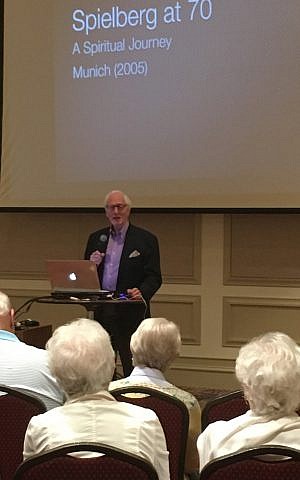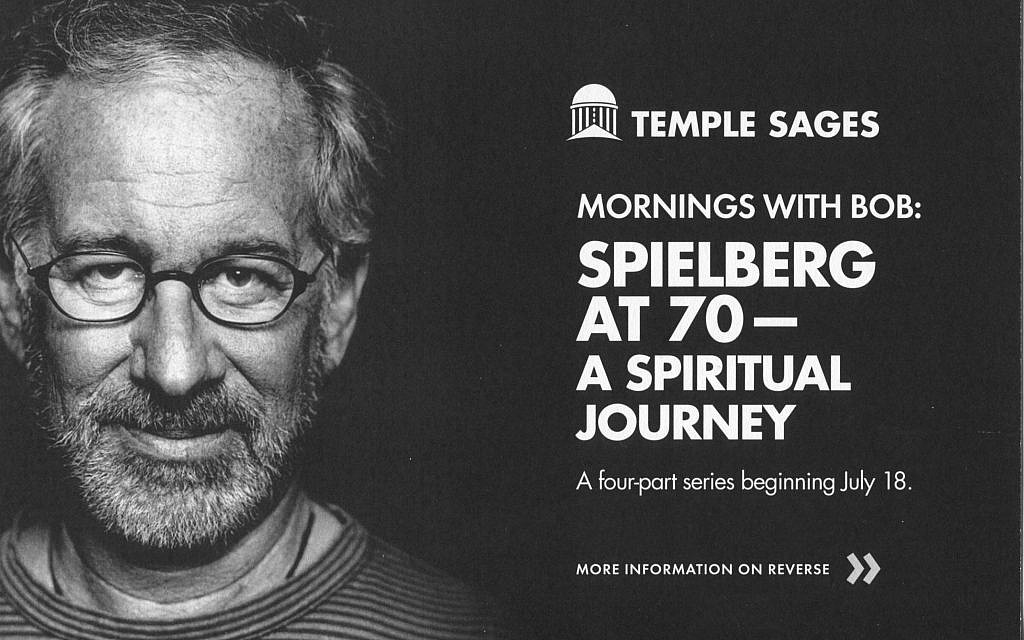Spielberg at 70: A Spiritual Journey
Who is responsible for political violence? Bob Bahr poses the question about Steven Spielberg's film "Munich."
Every Wednesday morning for four weeks, journalist Bob Bahr led a film and lecture series at The Temple to show and analyze films by Jewish Director Steven Spielberg. With coffee in hand, community members gathered in a conference room to explore the films and learn about Spielberg.
“We’re looking at Steven Spielberg’s life as a spiritual journey. Early in his life he did everything he could to deny that he was Jewish,” said Bahr, who is a former reporter, producer and news executive for CBS News and former producer with CNN’s documentary unit.
The first show in the film series was a 1986 cartoon called “An American Tail,” about a Russian-Jewish mouse that moves to America. The second week was a showing of the 1982 film “E.T.,” which “a lot of people don’t think of as a Jewish film, but it was very autobiographical,” Bahr said, referring to Spielberg’s childhood.
Get The AJT Newsletter by email and never miss our top stories Free Sign Up
In the third week, Bahr played the 2005 film, “Munich,” a period piece about the 11 Israeli athletes who were assassinated by a Palestinian terrorist group at the 1972 Olympics in Munich, and Israel’s retaliation.

Bahr posed this question about Munich to the audience: “Steven Spielberg, the filmmaker, is asking us ‘Where does the ultimate responsibility lie in political violence?’”
The characters in “Munich” raise questions about what it means to have a clear conscience and what it means to be a Jew, and to Bahr, the film wrestles with the concept of “how one takes moral responsibility for murder,” he said. “What does vengeance do to a nation and to a person’s soul?”
Marjorie Epstein found “Munich” to be “very compelling,” and said that overall attending Bahr’s class has allowed her to be “a little more in touch with Spielberg.”
After watching clips of “Munich,” Bobi Dimond said she was full of “memories and thoughts about the families and the people.” Dimond said, “I feel like we’ve all been through things, but nothing like what people went through then.”
Bahr believes Spielberg’s intention is to raise the question of morality to his viewers. “This film is a moral lesson for us, a way to question our own beliefs, a way to discuss among ourselves what’s right and wrong in what circumstances,” he said.
A showing of Spielberg’s 1993 film, “Schindler’s List,” concluded the lecture series.
About the filmmaker, Bahr said, “He’s made his Jewish life and his Jewish roots a part of his work; so many directors have not.”
Bahr said he was inspired to host film classes based on his newfound love of teaching and his belief that “there is a tremendous need in the Atlanta Jewish community for really quality, relevant adult education.”
Being in front of his community in his Spielberg lecture series lends itself to his interest in “how American Jews come to terms with their Judaism and come to terms with their love of Israel,” he said.




comments